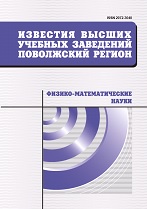|
This article is cited in 2 scientific papers (total in 2 papers)
Mathematics
To the question of uniqueness of degenerate singular integral equations solutions
I. V. Boykov, N. Yu. Kudryashova, A. A. Shaldaeva
Penza State University, Penza
Abstract:
Background. The work is devoted to the study of sets of functions in which the condition for the unique solvability of degenerate singular integral equations is satisfied. At present, the study of many sections of singular integral equations can be considered completed. An exception is singular integral equations that vanish on manifolds with a measure greater than zero. The theory of singular integral equations in degenerate cases is constructed, from which it follows that, firstly, degenerate singular integral equations have an infinite number of solutions; secondly, the first and second Noether theorems are not valid for these equations. But specific algorithms and approximate methods for solving singular integral equations in degenerate cases are absent. Due to the fact that many processes in physics and technology are modeled by degenerate singular integral equations, it becomes necessary to develop approximate methods for solving them. In addition, since in the Holder space and in the space $L_2$ of functions summable in a square, degenerate singular integral equations have an infinite number of solutions, the actual problem of distinguishing the uniqueness sets of the solutions of these equations arises, as well as the equally urgent problem of constructing approximate methods for solving them.
Materials and methods. To distinguish classes of functions in which degenerate singular integral equations have a unique solution, methods of the theory of functions of a complex variable, Riemann boundary value problems, and the theory of singular integral equations are used. When constructing approximate methods, iterative-projection methods are used.
Results. Classes of functions are constructed on which solutions, if they exist, are uniquely determined. In this regard, a new formulation of the solution of degenerate singular integral equations is proposed. Collocation and mechanical quadrature methods for solving degenerate singular integral equations on the constructed classes of functions are proposed and substantiated.
Conclusions. The proposed results can be directly used in solving many problems of physics and technology, in particular, in the problems of integral geometry, aerodynamics, and hydrodynamics. It is of interest to extend these results to degenerate polysingular integral equations.
Keywords:
singular integral equation, degenerate case, uniqueness of solution, mechanical quadrature method.
Citation:
I. V. Boykov, N. Yu. Kudryashova, A. A. Shaldaeva, “To the question of uniqueness of degenerate singular integral equations solutions”, University proceedings. Volga region. Physical and mathematical sciences, 2020, no. 1, 3–21
Linking options:
https://www.mathnet.ru/eng/ivpnz86 https://www.mathnet.ru/eng/ivpnz/y2020/i1/p3
|

| Statistics & downloads: |
| Abstract page: | 59 | | Full-text PDF : | 15 | | References: | 17 |
|




 Contact us:
Contact us: Terms of Use
Terms of Use
 Registration to the website
Registration to the website Logotypes
Logotypes







 Citation in format
Citation in format 
